Learn How to Identify Your Most Important and Lucrative SEO Keywords
Thanks for your interest in our SEO keywords guide. There’s probably a good chance that you found this guide through an online search on Google. Well, this is exactly what this primer is all about: you will learn proven and tested processes that will help you research and identify your target keywords and phrases. BTW – when I mention Google throughout this guide, I also mean other search engines such as Bing and Yahoo!
Why Keyword Research?
First things first. If you’re serious about getting your site found on Google, you have to invest time into performing keyword research in a scientific way. Researching keywords that will drive organic search traffic to a website is a huge part of our flagship two-day SEO training, and even though we spend a fair amount of time on keyword research during our classes, I still feel that it’s not enough time. I hope that this guide will provide additional value to our students and anyone reading this primer.
By performing this research in a systematic and scientific approach, you’ll eliminate the guesswork. When I ask our workshop attendees if they’ve performed keyword research, usually about 20% tell me that they did. Out of the 20% who did perform the research in some form or shape, only about half of them did it in what I would consider a scientific way. Getting your keywords right is only the beginning of your strategy. It’s sort of like planning a trip. Before you board a plane, you probably would like to know whether you’re going to London, Paris or Berlin.
Knowing your keywords and how many people are actually using these keywords to search for things on Google on a monthly basis is key to succeeding with your overall digital marketing strategy, but it’s only the beginning. Putting the keywords to work and getting those page number one rankings on Google requires time, resources and knowledge. While this guide will hopefully help you select the right keywords, I also invite you to learn more about our non-technical, self-paced, online SEO training course. The online course allows anyone to implement a powerful digital marketing strategy. No prior SEO knowledge or coding is required. Students also get access to all of our process templates and you’ll be able to start implementing the newly-learned strategies immediately.
[Improve Your Digital Marketing: In-person and Online SEO Training Courses]
What Are SEO Keywords?
So what’s a keyword anyhow? An SEO keyword, or phrase, is a combination of one or more words strung together that people type into Google when searching for something.
As you can see from the example below, if you search in Google for the keyword seo training denver, Google returns a search engine results page (SERP) which includes a number of other pieces of content that you’re competing against (blue box), paid AdWords listings (yellow box) and then the organic (aka natural) search results (green box):
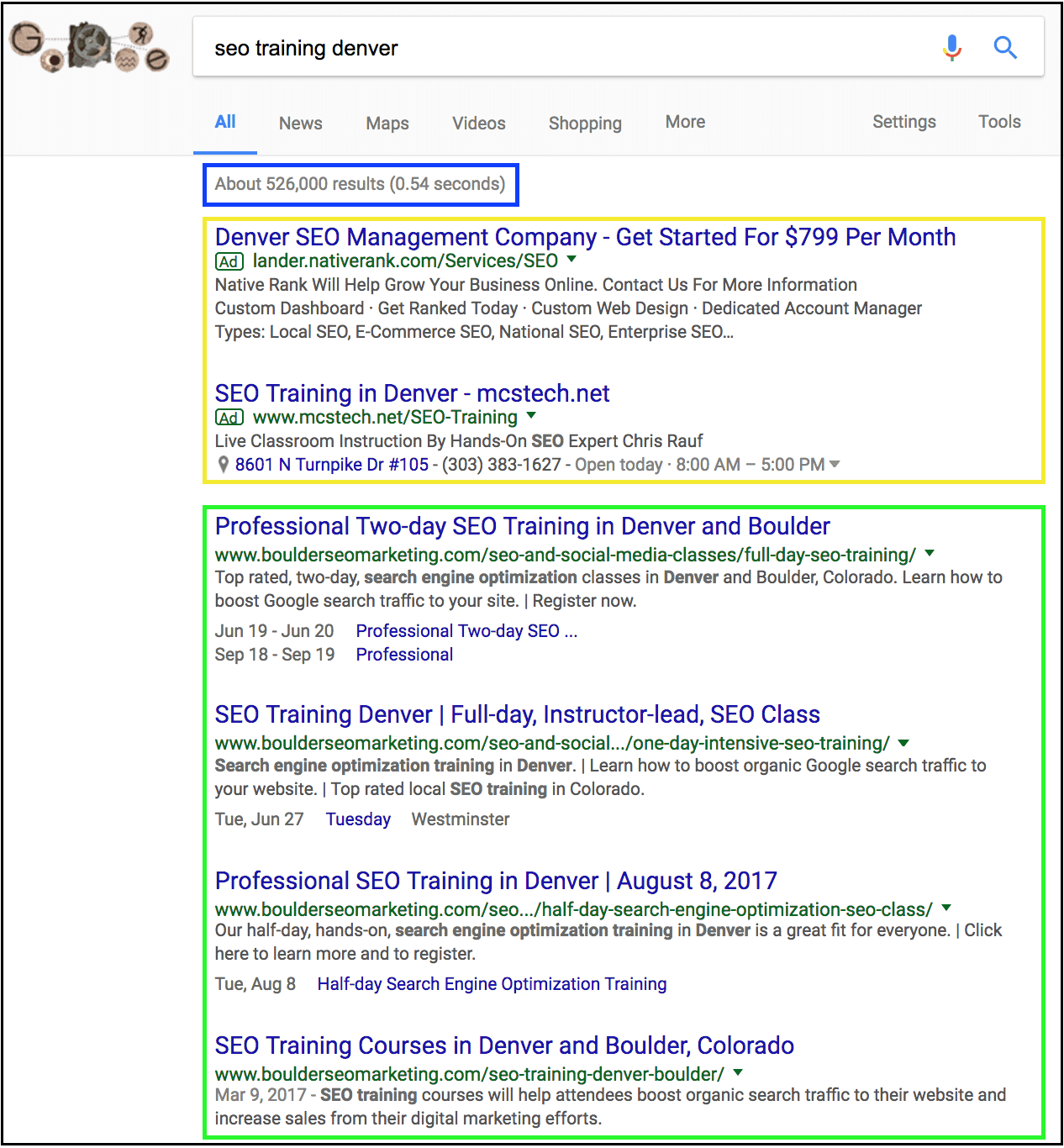
In this case, the search term seo training denver consists of three words strung together which puts it into the long-tail keyword category. Usually, search terms of one or two words strung together are classified as a short-tail keyword and search terms of three and more words strung together are considered a long-tail keyword.
Usually, higher search volumes are associated with short-tail keywords. These keywords are often used during the general research phase and are most often very competitive and quite hard to rank for.
People using long-tail keywords often know exactly what they’re looking for and if they find the right service or product on Google, they are likely to convert into a paying customer:
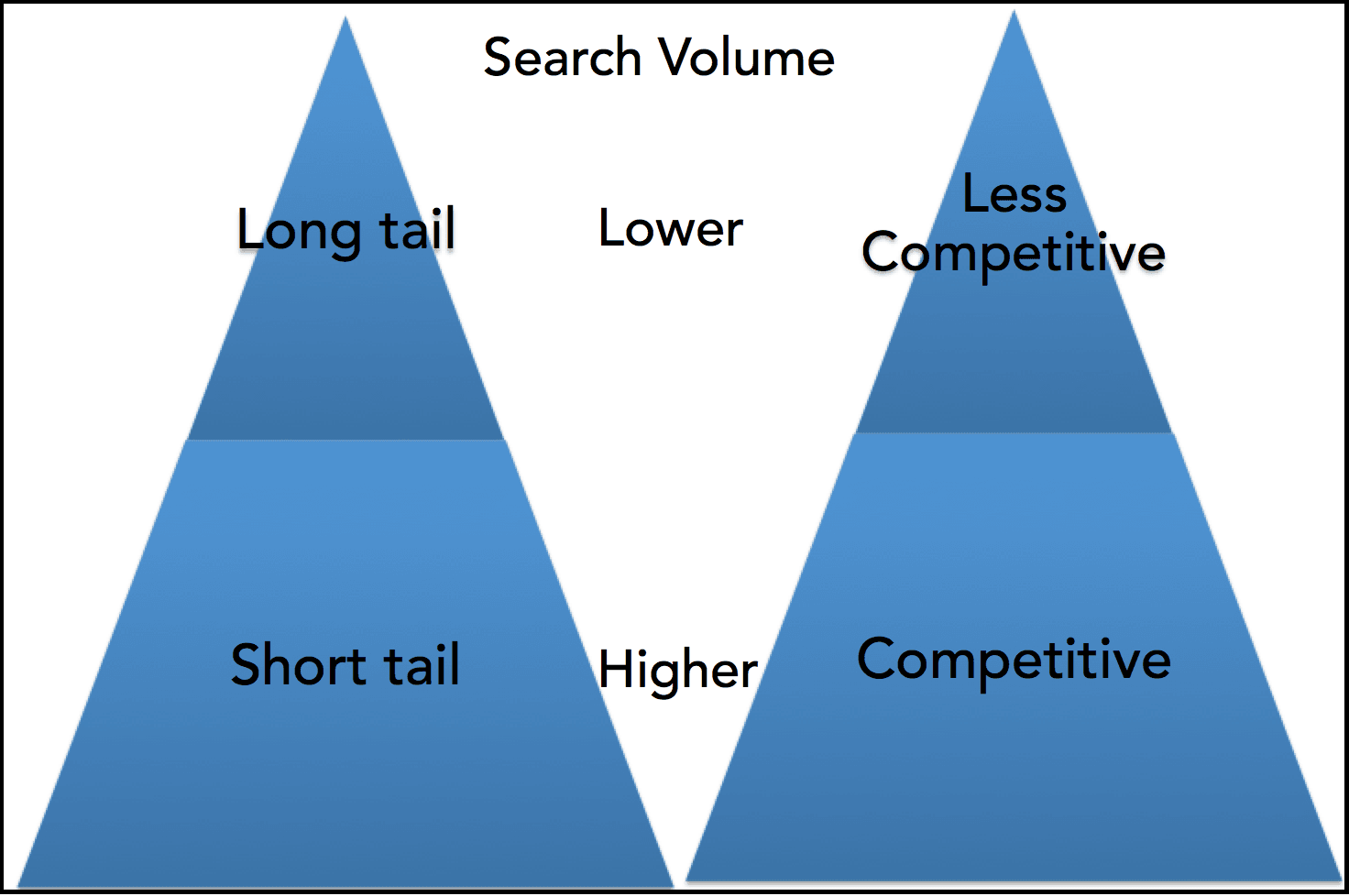
During the keyword research exercise at our classes, we often see students make the mistake of only adding short-tail keywords to their list of target SEO keywords. If you pursue this strategy, it may take a long time for you to see any kind of results. I’ll share more information on this topic as we dive deeper into the actual research phase.
Knowing Your Target Audience Is Essential
It’s essential to know and understand who your target audience is as part of your digital marketing strategy or else you’re just guessing. Before taking on new customers, we ask them to complete our standard onboarding checklist. I invite you to make a copy of this Google doc and use it as you see fit. As part of filling out the checklist, new customers also create basic buyer-persona profiles. The buyer-persona profiles, along with the other information that we’ll receive, allows us to better understand who’s performing the search on Google, their motivation, what stage of the customer journey they’re in, etc. Before investing time into the keyword research process, I definitely recommend that you complete this checklist. Otherwise, you may be shooting in the dark.
Tools, Tools, Tools
Love it or hate it, but you will need some tools to find those keywords. There are many free keyword research tools out there but you’ll definitely get a lot of mileage out of the research if you’re willing and able to invest in paid tools.
As part of your keyword research efforts, I recommend that you use one, or all, of the following tools:
- Google Keyword Planner (which is part of Google Ads)
- Google Search Console (formerly known as Google Webmaster Tool)
- Google Trends
- Twinword
- SEMScoop Keyword Tool
I seem to discover new tools on a nearly daily basis. Here’s a list of additional tools that I recommend you check out:
There are many more paid tools out there and I suggest that you do some research in order to find the tool that best fits your needs.
Picking the Right Tool for Keyword Research
Keyword research is a tools-driven process and Google’s Keyword Planner is usually my preferred tool. It is part of the Google Ads tools suite and it will provide you with the most up-to-date keyword data. However, it will require you to set up a Google Ads account and to run an active campaign. Click here to learn more about Google Ads and how to create a campaign so that you’re able to take advantage of the full range of data that this tool provides.
If you don’t want to set up a Google Ads account in order to be able to use Keyword Planner, you may want to try out Twinword. I’m currently beta-testing this new tool and really like it. In July of 2018, I had the pleasure of recording a 10-minute demo of the tool with Denise Wilhaus, Product Marketer at Twinword. I hope you’ll find some time to view the recording:
If You Could Pick Only One Keyword…
At the beginning of the keyword research portion of our classes, I ask students if their website could rank number one on Google for only one search term, what would it be?
This exercise truly gets people thinking about the overarching keyword that they would use in an elevator pitch to describe what their company is all about. Once you’ve successfully explained the overall concept of your company to your fellow elevator rider, you’d probably use a different set of words to describe specific services or products that you’re offering. This is how you need to think when starting your keyword research exercise.
If my neighbor Jim would ask me what I do, this is what I would tell him: I run an SEO company in Denver and Boulder, Colorado. We offer highly effective and affordable SEO packages and no long term contracts are required to work with us. Our goal is to prove to our customers, month-after-month, that they selected the right partner. We also offer in-person and online SEO training courses.
Let’s take a closer look at the keywords that I highlighted in blue:
- SEO company in Denver: After performing keyword research, which I’ll explain how to do shortly, I know for a fact that, on a monthly basis, about 70 people are searching exactly for this keyword on Google. There are a lot of other short-tail search terms such as Denver SEO or SEO Denver with much higher search volumes. However, since we just recently opened an office in Denver, we decided to pick this long-tail keyword since it will be easier for us to rank higher in a shorter amount of time than for the more competitive short-tail keywords. This isn’t the only keyword that we’re optimizing for, and that in a broad sense describes who we are and what we do, but given the circumstances, it’s probably the keyword we’ll spend the most effort on in the short term.
- Affordable SEO packages: In this case, I did my research and I know for a fact that about 320 people, on a monthly basis, search for the keyword affordable SEO packages in the USA alone. Although it’s considered a long-tail keyword, it’s a highly competitive keyword and it takes quite a bit of work to rank on page number one on Google. It’s well worth the effort though because we usually convert an interested customer into a committed customer. With a team of nearly 50 Colorado-based digital marketing experts, we truly offer some of the most effective solutions. If someone gets to our website and ends up speaking with us after doing a search on Google for this keyword, there’s a really good chance that they will become a customer.
- SEO training: This is another highly competitive but very lucrative keyword. About 1,300 people on a monthly basis are searching exactly for this keyword in the USA. Since we’re offering one of the top-rated two-day certification classes here in the Denver area, and also a self-paced online training, we have exactly what these people are searching for.
Once you have a clear idea about the overarching keywords that in a broad sense describe who you are and what you do, it’s time to do some research to find a set of closely-related keywords that you’ll want to include in your list of target keywords. Only using the same keyword over and over again will be seen as keyword stuffing by Google and your site may get penalized for this practice by the search giant.
A Quick Word About Branded Search Terms
Although potentially tempting, don’t optimize your website for keywords that include your company’s name. If someone is searching for your company using your company’s name, Google is smart enough to usually return your website as the number one listing in their search results.
Of course, it makes sense to use branded search terms such as nike running shoes if you’re an eCommerce site who sells Nike products, etc.
A Quick Word About Location-Specific SEO Keywords
Finding the right keywords and phrases for your company will depend on a number of things, including but not limited to the size of your company, the geographical location that you’re targeting, the number of products and/or services you’re selling, etc.
For example, Google may show very different results in relation to a search for seo training vs seo training denver.
Instead of just searching for that they are interested in, people will often also include what is called a geolocator. If your business is a local business, serving customers in a specific town or city, make sure to research if your target audience is including a geolocator in their online searches.
If your business is primarily a web-based e-commerce business, with no specific geographically dispersed office locations, geo-targeting is most-likely not that important for you.
Using Google’s Keyword Planner for Keyword Research
As mentioned above, let’s take a look at how to perform research for the keyword seo training. Our digital marketing and SEO courses now attract attendees from all over the USA so I’ll use this search term as the seed keyword to get started with Google’s Keyword Planner. If you’re not familiar with this tool, I recommend that you read the information provided by Google.
As you can see from the screenshot below, after performing a search for the keyword seo training, I now know that on average 1,300 people in the USA are searching for exactly this keyword. Since the Keyword Planner tool is part of the Google Ads tools suite, the tool will also provide with additional information that will help you decide whether or not you’d like to add this keyword to your Ads campaign:
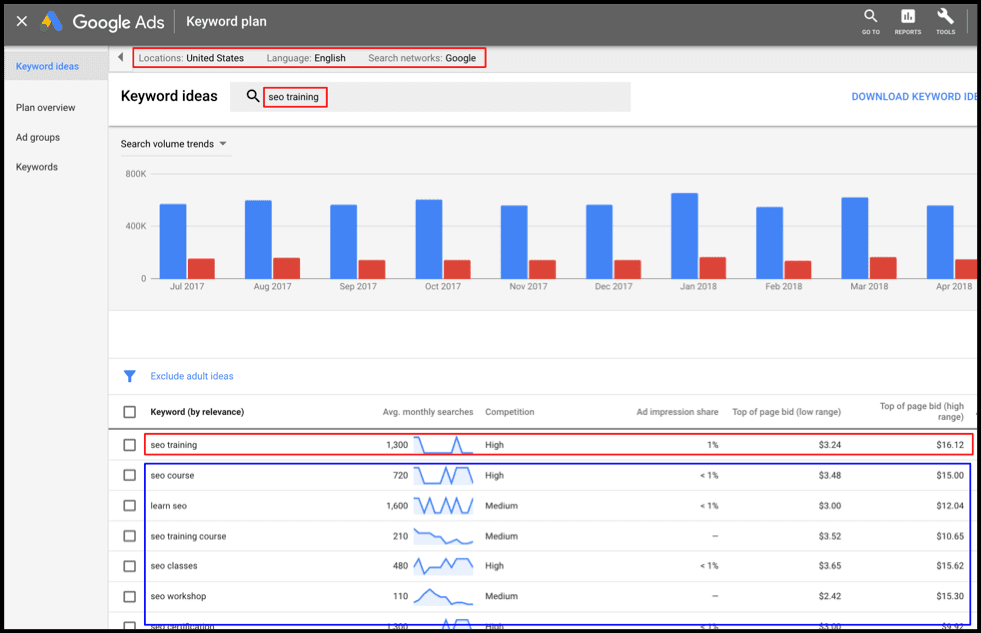
Running Google Ads campaigns for certain keywords can be a great way to get more traffic to your website right away. However, you’ll pay for every click and this can add up rather fast. Google Ads is the sprint and SEO is the marathon. It’ll take you a while to achieve those page number one rankings organically but it’s the gift that keeps on giving back. Once your website is getting rewarded from Google with page number one listings, you’re likely to stay up there and you’ll continue to see organic search traffic to your website.
Besides now knowing that there are 1,300 people on average searching for this keyword, Google also provides us with additional keyword ideas. Since you can’t only use the one and same keyword on your website, you’ll have to find a set of complementary keywords that you can use along with your primary keyword. Google will often produce a list of 400 – 700 keyword ideas.
Now click the Download Keyword Ideas button to download a CSV file of all of the keyword data:

After downloading the data into a CSV file, I usually delete columns C and G-L since we’ll focus our attention on the Avg. Monthly Searches, Competition and Suggested bid data only as they related to the keywords:
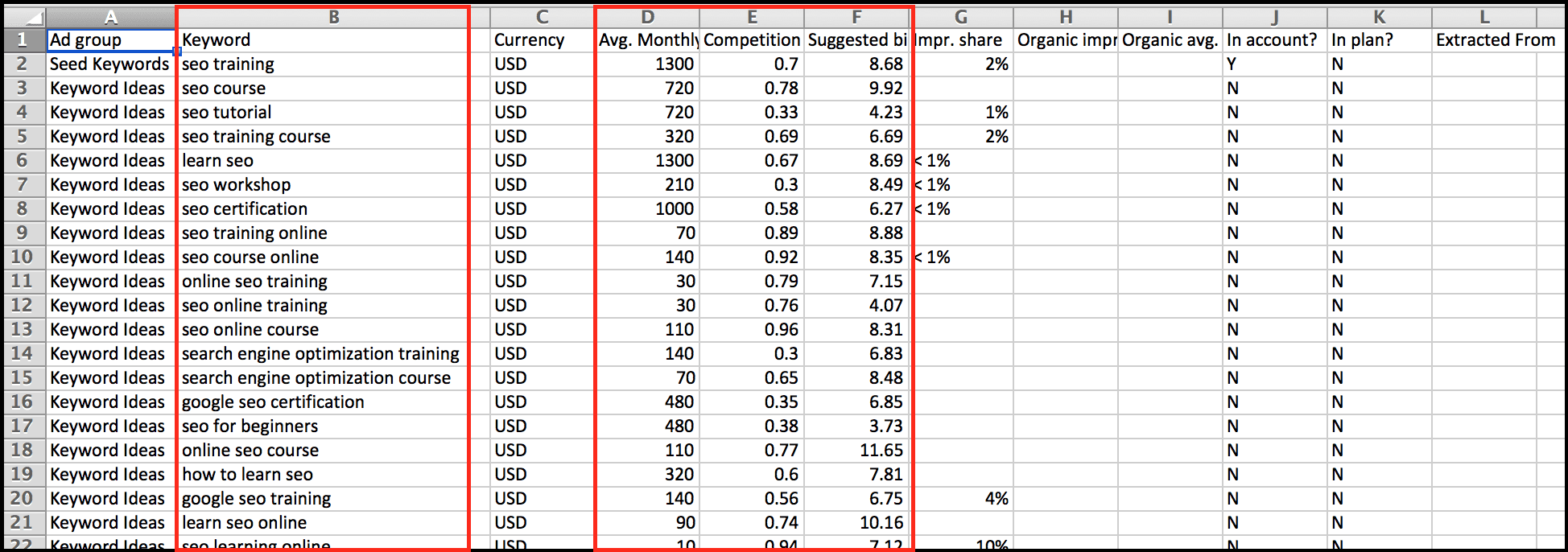
I’ll then copy all of the data over to the Target Keywords tab of the Marcom workbook which is part of our Google docs process and project templates. You can view a detailed explanation of all of our templates as part of the free preview of our online SEO training.
Prioritize and Categorize Your Keywords
Once I pasted the relevant data over to the Target Keywords tab, I’ll start to rate, or prioritize, the keywords and I also categorize them by the products or services on my site. We usually use abbreviations such as ST which stands for keywords that would fall into the overall SEO Training category:
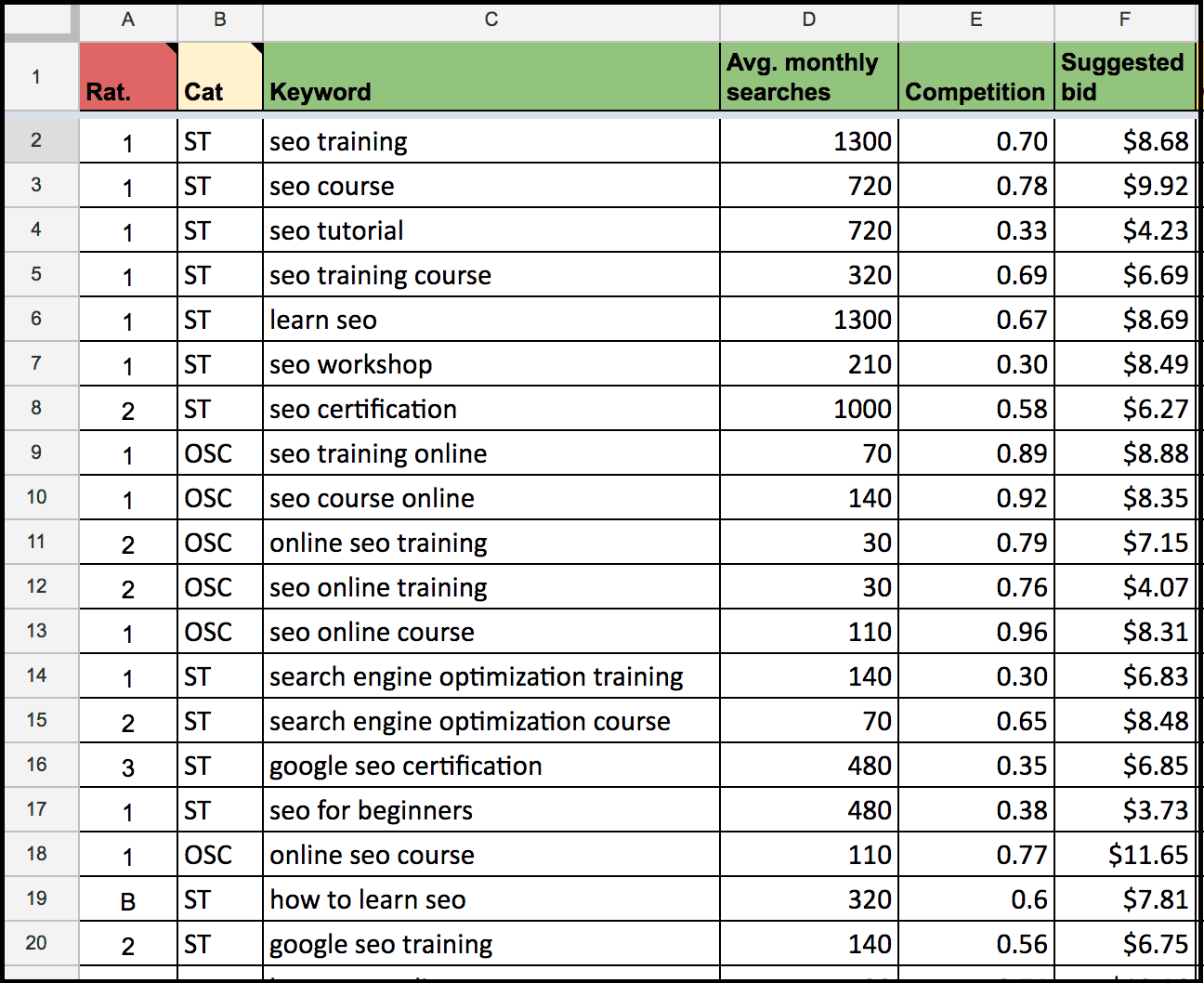
I usually use the following rating system for keywords:
- 1: 1st Priority
- 2: 2nd Priority
- 3: 3rd Priority
- 4: Not applicable
- B: Blog post topic
The 1st Priority keywords are the keywords that I’d like to dominate first and so on. When going through your list of keywords and phrases, you’ll sometimes encounter a keyword that lends itself for a blog post title. In the example above, you’ll see that I rated how to learn seo as B. This means that I’ll draft a blog post about this topic and the title will be How to Learn SEO. I’ll also make sure that the URL of this blog post will be www.mysite.com/blog/how-to-learn-seo. Keywords in URLs still matter, especially if they are relevant in relation to the content on that particular page.
Keyword Mapping
Keyword mapping is an important part of the overall keyword research process and I recommend you do a bit of research on this topic. Rand Fishkin of Moz shares great information in one of his Whiteboard Friday videos.
Essentially what it boils down to is that you need to individually assign your target SEO keywords to all of the pages on your site. Every page on your site should get optimized for no more than 2-4 keywords. You’ll want to assign keywords that would fall into a specific keyword category (i.e. seo training, seo classes, search engine optimization workshop) to a particular page. This will help Google better understand what a particular page is all about. I use a mind mapping software called Bubbl.us for this process and the image below is an example of what this could look like:
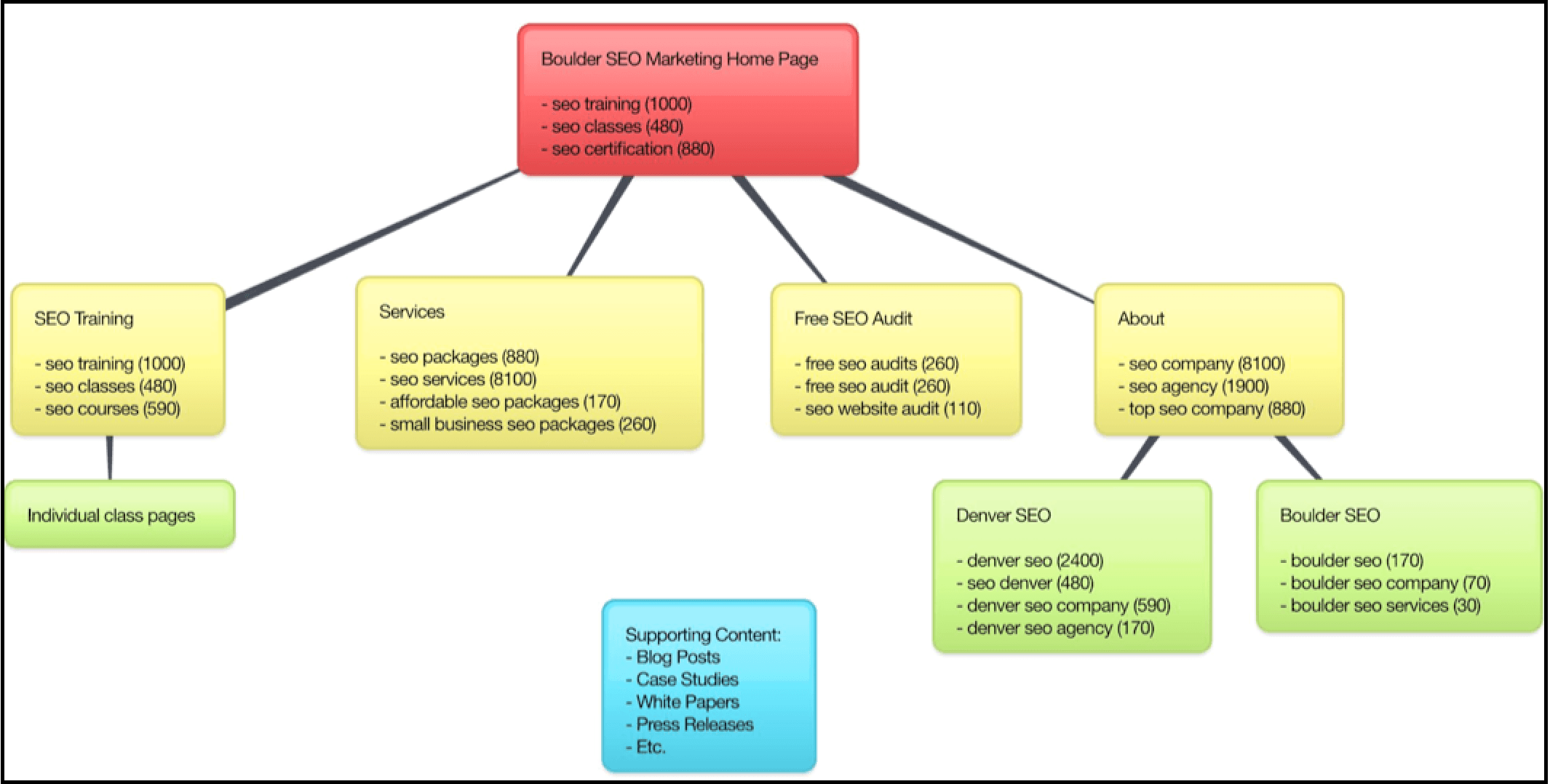
The SEO Keyword “Gut” Check
Although I’m a big fan of the gut check, when it comes to selecting my target SEO keywords, I prefer to use some proven and tested techniques and tools. Optimizing for potentially the wrong keywords could cost you a lot of time, resources and money.
Once done prioritizing and categorizing the keywords, professional agencies will use the following (or a similar) process to make sure that the right keywords are selected:
Let’s again use keyword seo training for this example. I’ll first head over to Google Trends. As you can see from the screenshot below, there are certainly some ups and downs in terms of interest for this keyword and topic over time. Overall though, the trend is very stable and currently looking up:
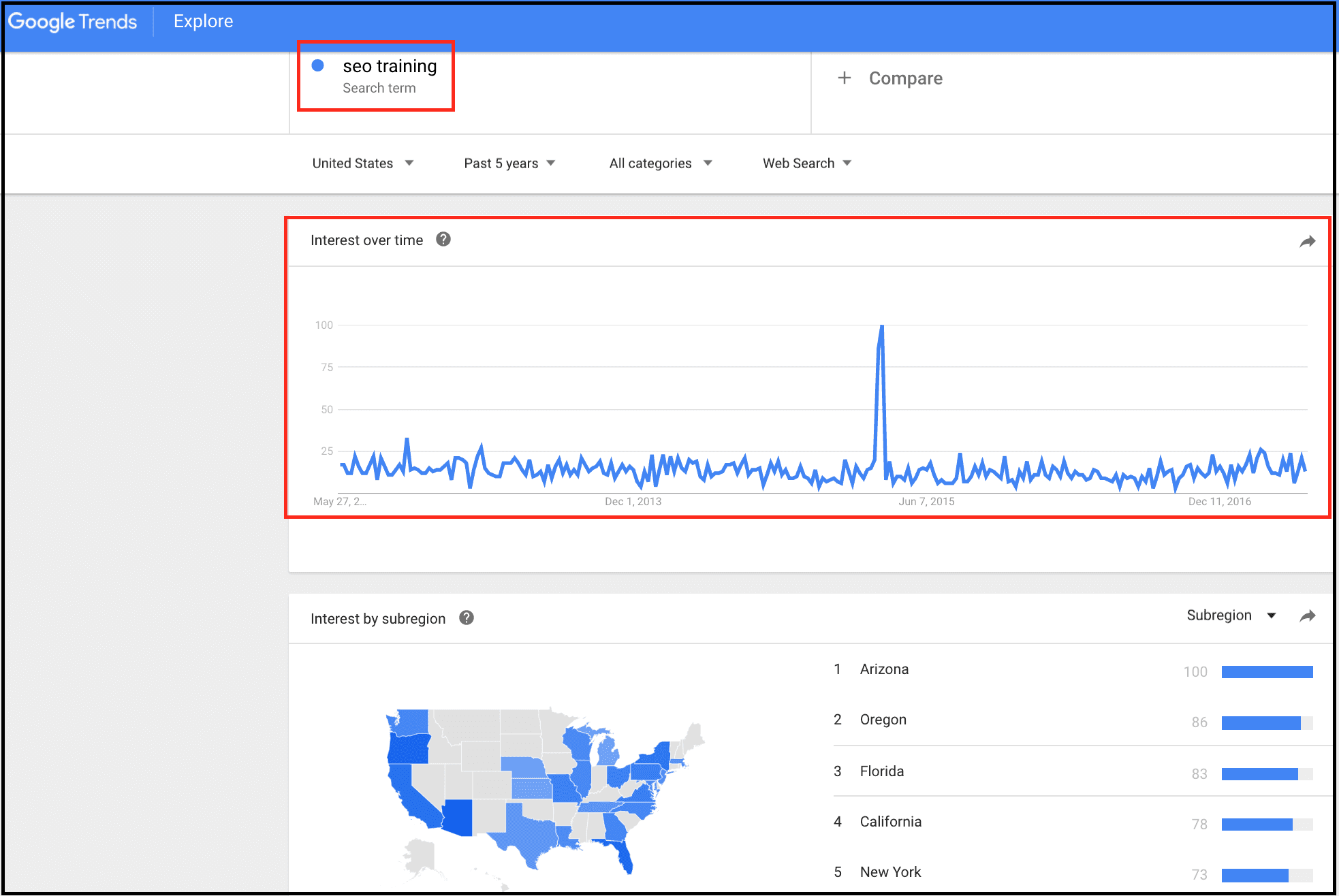
Once I know that I’m not selecting a keyword that’s in a downward spiral, I’ll head over to the Moz Keyword Explorer tool. This tool is part of the Pro version and one of my preferred paid tools. It’s essential for keyword research, allows me to track keyword rankings and much more. They offer a free trial and it may be worth your time checking this tool out in a bit more detail. Based on the key metrics that this tool provides me with in relation to a specific keyword, I can now make the final decision as to whether I’ll include it in my overall strategy or not:
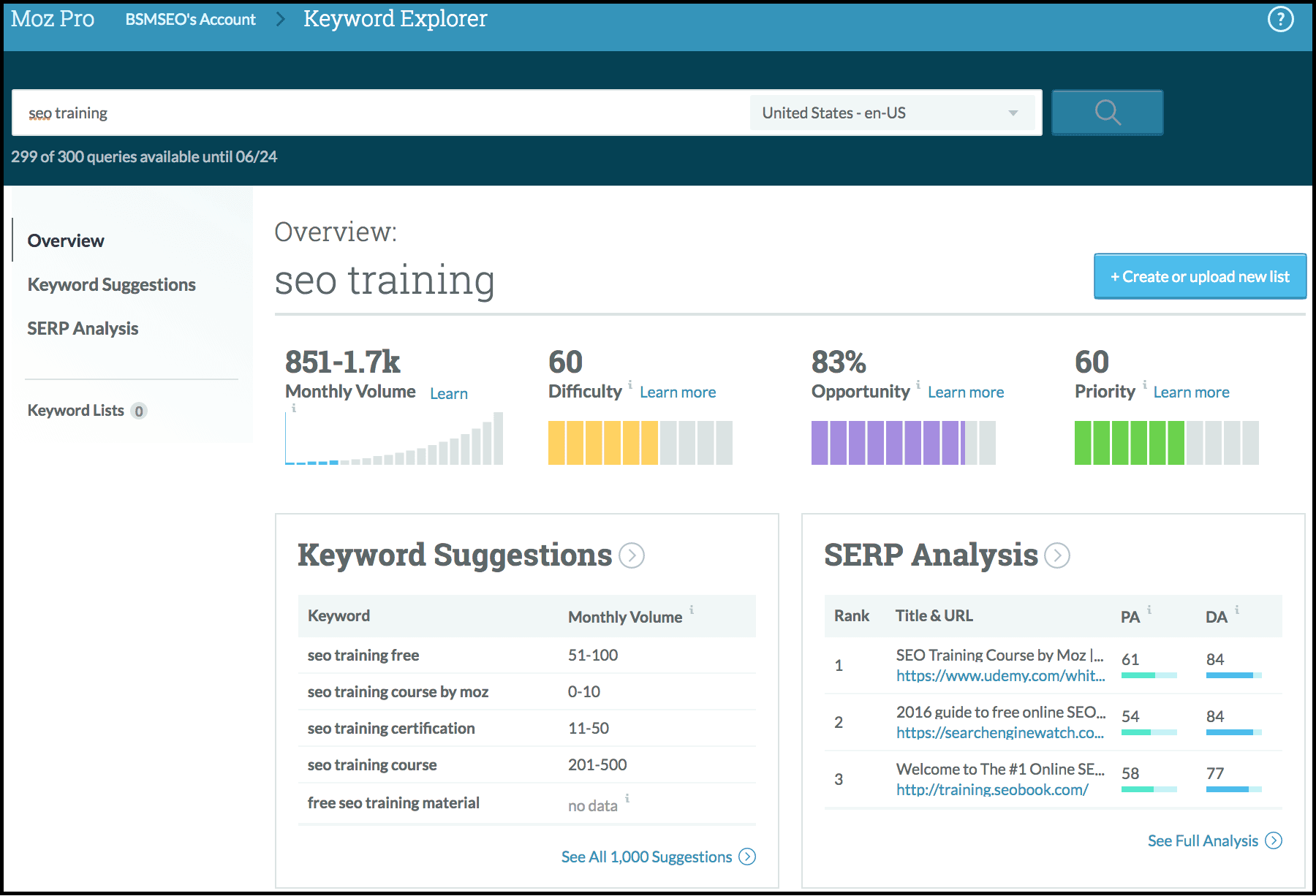
Let’s take a closer look at these metrics. Moz explains what these metrics stand for as follows:
Monthly Volume: Volume ranges show you (with 95% or more accuracy) how often a term or phrase is searched for in Google each month.
Difficulty: A score from 0 (easy) to 100 (difficult) that estimates how difficult it is for you to rank higher than current competitors on the first page of search results.
Opportunity: A score from 0 (low) to 100 (high) that estimates the relative click-through-rate of organic web results (the first ten blue links) for this keyword. When other SERP features (ads, verticals, etc.) compete for searcher attention, this score is lower.
Priority: A score from 0 (low) to 100 (high) that combines all of the other metrics, including your custom Importance score. Higher priority represents a sweet spot of higher volume and opportunity with a lower difficulty.
Organize, Track, Measure, Improve and Update
Once you’ve gone through all of the above steps, you should now have a list of your target SEO keywords. They should be organized by category, based on the products, services, etc. available on your site, and they should also be rated in order of importance. As mentioned earlier, we use paid tools such as Moz to track the rankings of the keywords in relation to a website. Tracking the rankings of your keywords on a monthly basis will allow you to measure if or how your SEO efforts are working. It also allows you to improve and put more effort into your strategy if you see that things aren’t working the way they should:

Professional agencies will usually go back to the drawing board once or twice a year to reevaluate and update the list of target keywords. I recommend that you do the same thing.
[Bonus Exercise] Identify Your “Low-hanging Fruit” Keywords
If your website has been up and running for some time, I recommend that you also take advantage of the data that Google Search Console (formerly known as Google Webmaster Tools) provides. If you haven’t already, setting up Search Console is free and easy and here’s some information on how to do it.
Once this tool has started to collect data from your site, you’ll be able to see what keywords from Google searches are driving traffic to what page on your site and much more. Unfortunately, Search Console provides a limited amount of the actual data but it’s still very useful data and extremely helpful in order to identify the “low-hanging fruit” keywords of your website.
Log into Search Console, then click on Search Traffic and now click on Search Analytics. Once you’re there, apply filters and slice and dice the data as you wish. As you can see from the example below, this view allows me to identify the keywords that are currently driving visitors to this page on my site: www.boulderseomarketing.com/seo-packages.
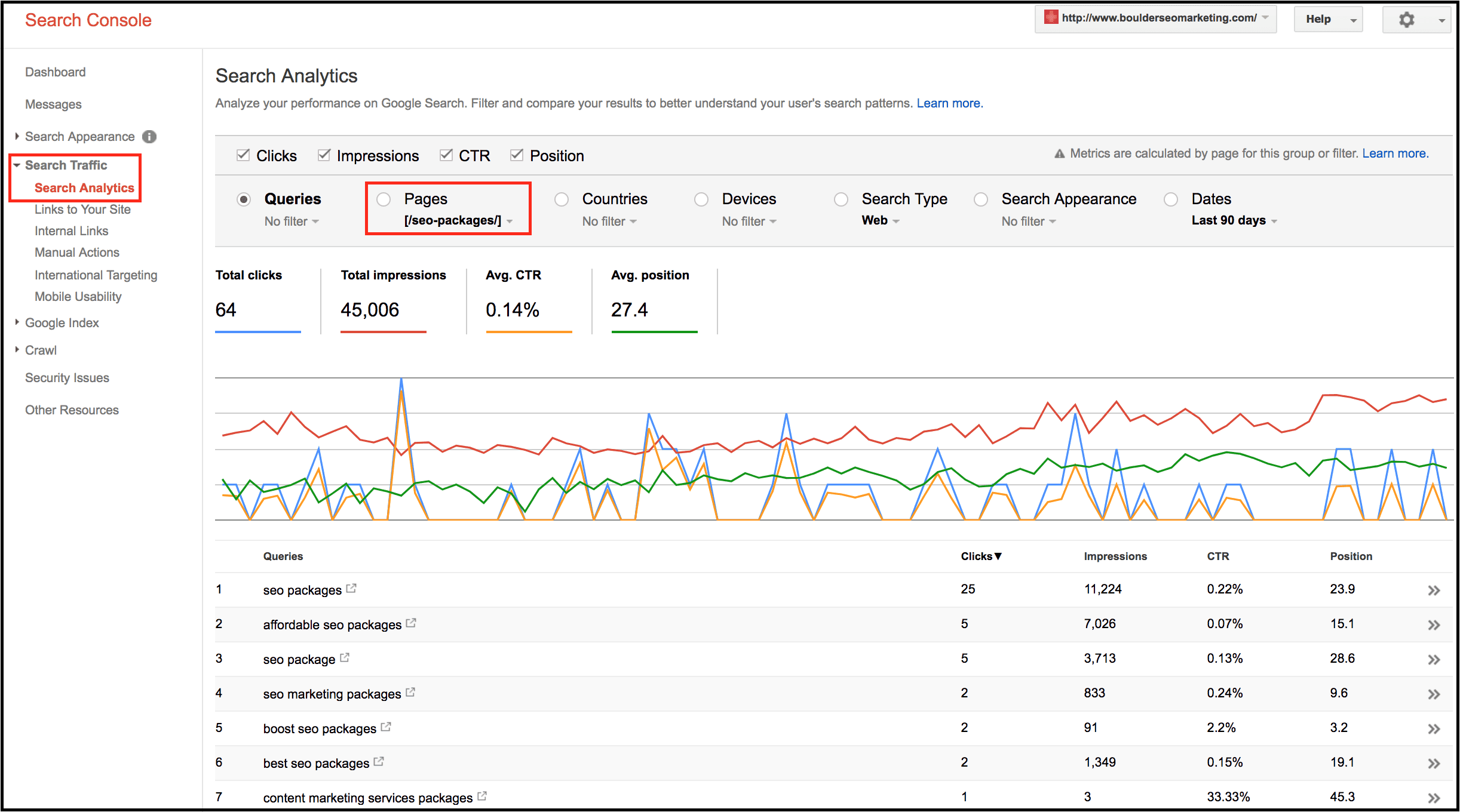
By checking the appropriate boxes on this dashboard, you’ll be able to see the number of clicks, impressions, click-through-rate (CTR) and position for the keyword in relation to this particular page.
The Definition of a “Low-hanging Fruit” Keyword
Historically, the first four organic search results on Google get between 70-80% of all clicks. So if you rank on position five and lower, you’ll miss out on many of these clicks to your site. Here’s my definition:
A “low-hanging fruit” keyword is a search term that already drives organic search traffic to a particular page on your website. The webpage is currently visible on Google between spots #5-25.
Getting into that position 1-4 sweet spot on Google is not that easy. However, knowing that particular pages on your site already rank well for certain search terms will allow you to add these golden nuggets to your target SEO keywords list, assuming that there’s enough search volume.
Based on the information provided to me from Search Console, I see that keywords affordable seo packages, seo marketing packages and best seo packages fall into the “low-hanging fruit” keyword category for this page on my site: www.boulderseomarketing.com/seo-packages.
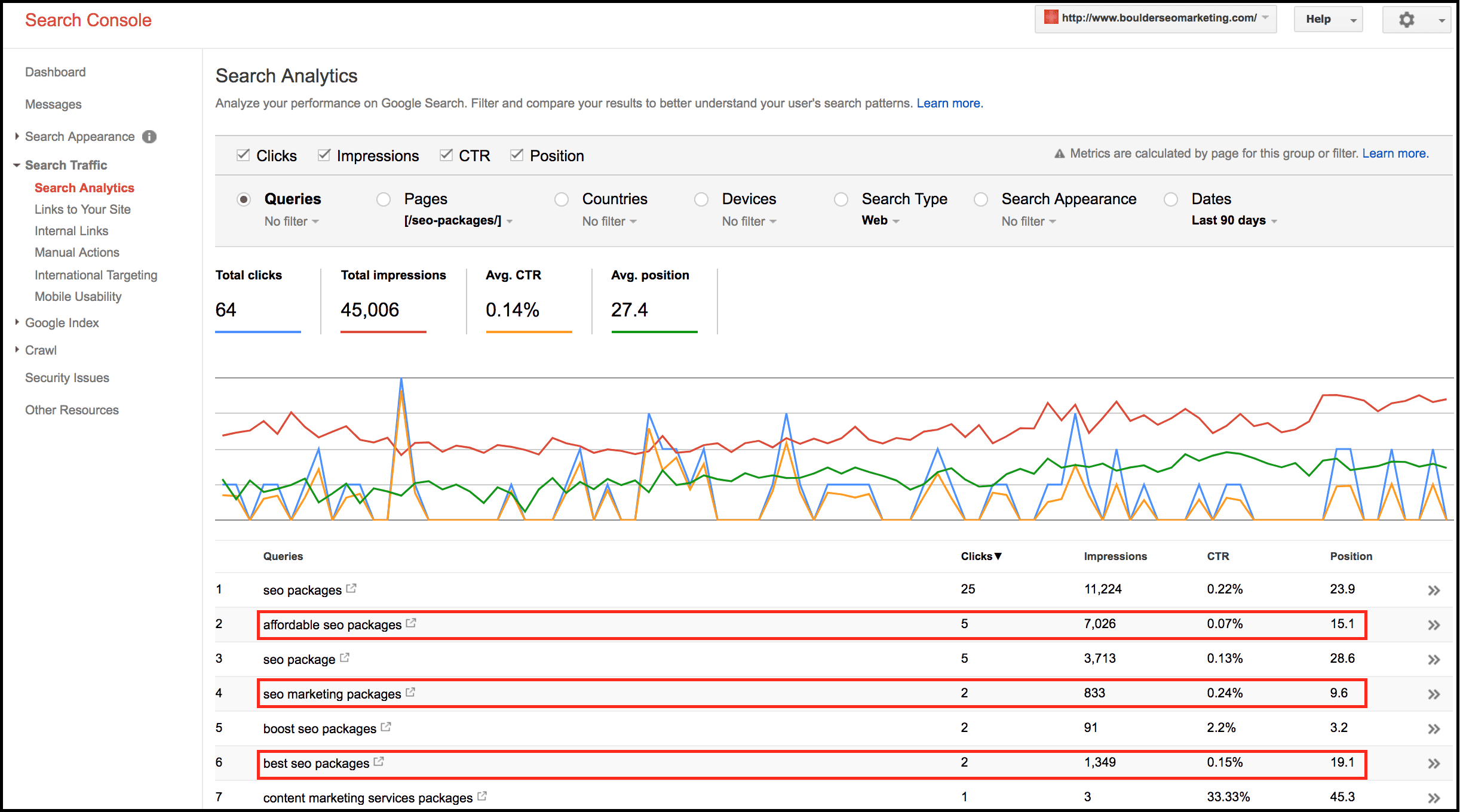
We perform extensive research on hundreds if not thousands of keywords that are already working in some form or shape for our customers, but for the purpose of this exercise, let’s only take a look at the above-listed three keywords.
Using Google’s Keyword Planner Get search volume feature, I’m now able to identify how many people, on a monthly average basis, are searching for these keywords:
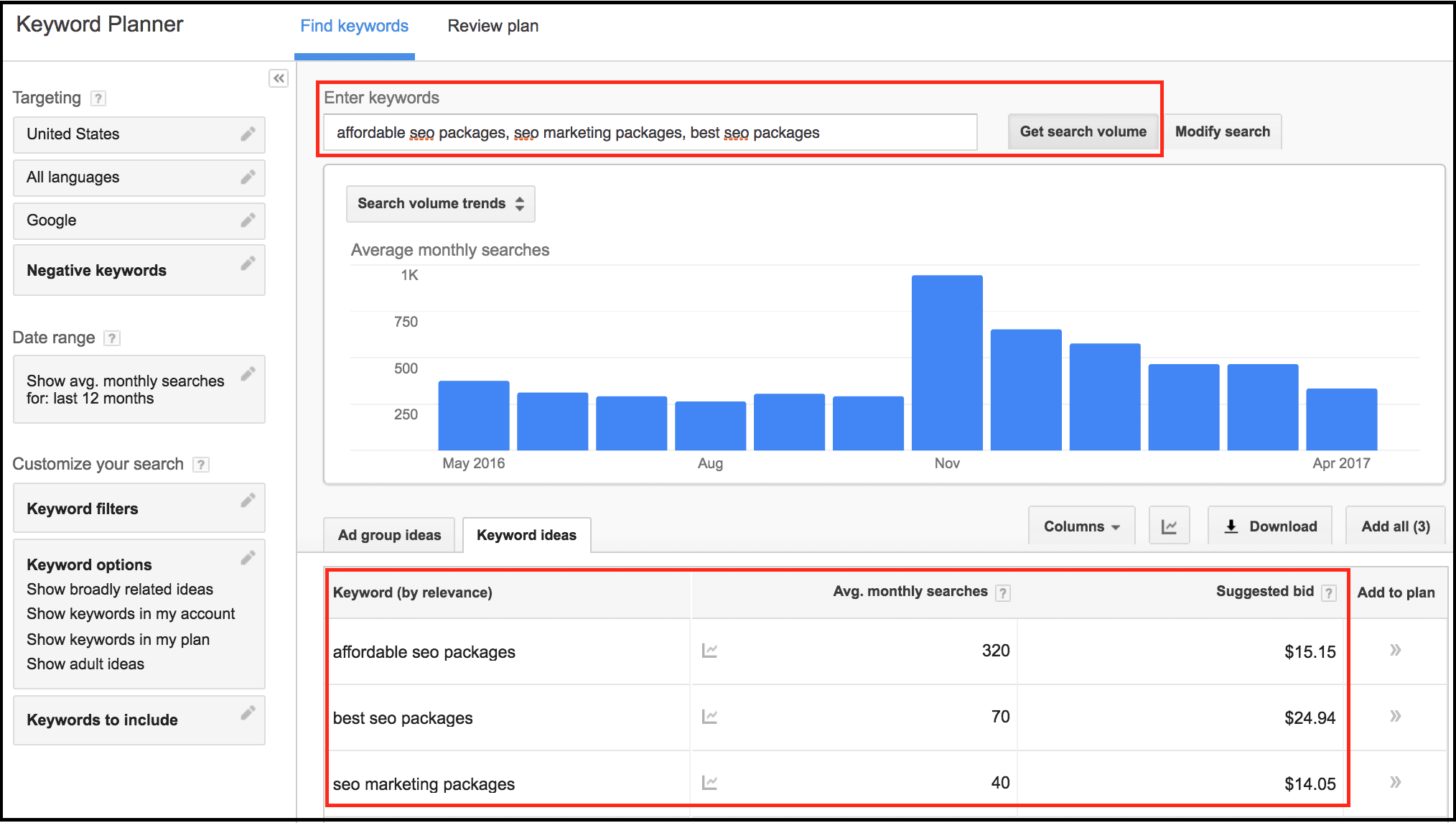
If I could pick only one out of these three keywords, I’d probably pick affordable seo packages. There are on average 320 searches per month and my web page already ranks at position 15 for this search term. By implementing a strong SEO strategy around this keyword, there’s a pretty good chance that I’ll get into position 1-4 rather sooner than later.
Conclusion: SEO Keywords – It’s Just the Beginning
Every customer is a bit different so please use this primer as a general guide and perform additional research based on your specific circumstances. Researching, identifying and deciding which keywords to use in your SEO strategy is just the beginning. It’s only a very small part of the many tasks that lay ahead of you. There are roughly 250 main ranking signals in Google’s algorithm and the better you address each and every one of these signals, the more successful you’ll be. You can place all of these ranking signals onto one of five pillars, with the foundation being a high-quality content marketing strategy. I invite you to learn more about what I call the “5 Pillars of SEO Methodology“ and I also encourage you to keep on educating yourself.
Professional digital marketing agencies such as my company spend thousands of dollars each year on tools that help us with tasks such as performing keyword research for our customers. We are experts and we do this on a daily basis. Getting your keywords right is absolutely crucial to the success of your strategy. Although I hope that this guide will help with this task, I certainly invite you to reach out if you should need help.
I’ll revise and edit this guide from time-to-time so make sure to bookmark it or join our mailing list to receive occasional updates.
Our self-paced, non-technical, online SEO training allows anyone to implement the entire methodology, step-by-step. Also, by joining this group on LinkedIn, you’ll be able to ask me questions, share information and interact with others who are also interested in SEO and digital marketing.
Best,
Chris
